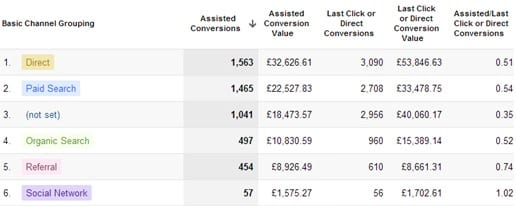An example of using Google's Multichannel funnels reports to prove the value of digital media
There have been quite a few recent stories detailing how big brands such as Interflora have fallen foul of Google or announcing they have ‘stopped using’ digital marketing as it ‘doesn’t work’. For example, a piece of research conducted by Ebay, led to reports in the trade press claiming that ‘PPC doesn’t work’.
These stories led me to dig a little deeper into the research conducted by eBay to identify what the real story was and not what the press would lead us to believe. The test conducted by eBay in essence stopped paid search on non-brand keywords for 60 days and results indicated that on average ‘consumers do not shop more on eBay when they are exposed to paid search ads on Google’. They found therefore that Google ads did not play a role in the ‘selling’ of an item i.e. in persuading an individual to purchase.
However the results also found that the ads did result in an increase in new registered users. So, going back to the headlines stating that 'eBay declare that Google Ads don’t work', this is, for me a misleading statement. However, it does show why it's important for ecommerce retailers to have a defined digital marketing strategy based on accurate reporting and attribution of sales relevant to their own situation.
In terms of persuading people to buy an item, eBay state that PPC doesn’t achieve this. Therefore what they have found is that seeing PPC as a ‘sales tool’ for them doesn’t work. However what it does work for is to introduce and re-introduce people to eBay and encourage new registrations on the site – but this is an action that also hold value as these new registered users will ultimately spend on eBay at some point in the future!
Most ecommerce retailers won’t have the brand recognition or positioning that eBay holds and therefore strategies for driving traffic and creating brand awareness are extremely valuable.
Conversion optimisation strategies that are essentially the ‘persuasive’ or selling techniques that encourage or close a sale.
Developing marketing and ecommerce strategies that touch all of these bases is essential, along with continual monitoring of the results in terms of traffic and of sales. Attribution software has been one of the most useful developments in this type of analysis as it allows you to identify whether the marketing channel is one that is working for introducing the sale, or for closing it.
Using Google Analytics to review media channel effectiveness
Google Analytics Multi Channel Funnels reports in the Conversion report of GA provide a simple tool to allow you to assess this. The Assisted Conversions report allows you to analyse your marketing channels’ contribution to revenue. Here's an example showing the contribution of paid search.

The last column- the Assisted/ Last Click or Direct Conversions column details a ratio of the channels’ overall role in the sales process. This ratio is interpreted as follows:

In the example above we can therefore determine that PPC in this case is equally useful in this case for assisting and in completing sales with a slight skew towards assistance or introducing a sale. Whereas the ‘not set’ channel which contains affiliate marketing, we can see is more important in completing or closing sales, performing that ‘persuasion’ function.
So, when reviewing marketing strategies for your ecommerce site, ensure that you take a look at the channels that you are using and ensure you have a good mix of channels that both introduce and close a sale.







